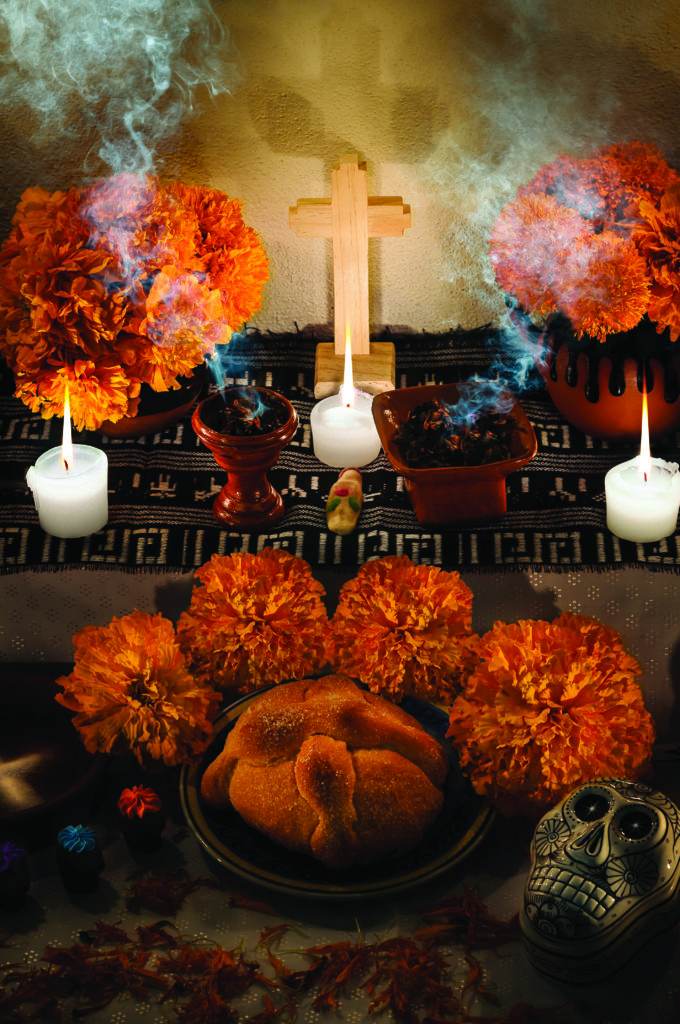Widening Our Circle
of Gratitude
BY ANINHA LIVINGSTONE
The practice of gratitude is one that changes our state. This shift in attention has the power to rearrange our hearts, broaden our thinking, and expand our energy field. As we remember what we are grateful for, we weave ourselves more deeply into the fabric of life, disrupting habitual ways of thinking about ourselves and the world.
One habit that we may not even be aware of is that of limiting our expression of gratitude to the living. In a culture that relegates ancestors to cartoon ghosts and Halloween costumes, our reference points are diminished. So too is our connection to those who came before.
For those of us who have not been raised in a culture that honors ancestors, it can help to examine our own cultural biases. In the field of psychology, people who report hearing unexplained sounds are said to have auditory hallucinations. If they see something that others do not, they are understood to have visual hallucinations. Granted, some culturally nuanced additions have been incorporated into diagnostics, acknowledging diverse views on health, illness, and ultimately reality itself. Nonetheless, experiences outside the norm are prone to fall into a narrow storyline.
The truth is, about 45% of Americans believe in ghosts, according to polls taken in the last three years. This is not to minimize or deny the reality of those who suffer from intrusive or medically induced hallucinations but rather to address the continuum of experiences, which includes vibrant health and expanded sensory awareness.
My own encounter with this realm places me in the 45%. When I was 14, my father died, yet I continued to feel his presence. My mother, who was not metaphysically inclined, also sensed him. His restless spirit disturbed her. Although it was outside her usual belief system to do so, she sought spiritual assistance.
I remember two people coming to our home. They invited us to stand in a circle while they addressed my father. I don’t remember what they said, but I do remember my mother and me sensing quite strongly that he had moved on and found peace.
Although this may seem New Age to some, there is a long cross-cultural history that predates it. The ancient Greek cultures was one among many that normalized this phenomenon, referring to it as psychopomp, pompos meaning “guide,” and psyche signifying “breath or soul”—in other words, one who guides souls.

Many continue to care for the dead in ways that have been passed down through generations. The Jewish practice of reciting kaddish, for example, can be seen as a means of helping the soul of the deceased to journey upward.
Also, during the Mexican Day of the Dead, food, drink, music, flowers, and such are offered to remember and sustain loved ones. Modern-day funerals of all persuasions continue to be a powerful expression of paying tribute to those who have passed, although not all maintain the belief that the deceased are fed by attention from the living. These acts of support, remembrance, and love can be understood in part as expressions of gratitude, for when we are grateful there is a natural impulse to give back.
Although we live in starkly different times than our distant ancestors, and many traditions seem to have sunk to the bottom of the American melting pot, some things are perennial. It turns out that storytelling is one of them; it is both an ancient and contemporary doorway to experiencing ourselves as part of a much larger story.
Research indicates that the sharing of family stories over time can create what is called an intergenerational self, resulting in greater resiliency. Although the research focused on children, my experience, both personally and professionally, leads me to believe that adults benefit as well.
How do your family stories live in you? Do you know where your ancestral bones lie? If your people immigrated here, what stories do you know about their journey? Do you sense what hopes and fears may have lived in their hearts? If they were enslaved, how do you relate to their struggles, their strengths? We each have unique family stories depending upon the thrust of history and where our people stood in its unfolding.
Whether we believe in an unseen realm or not, stories link us to a larger identity, one in which we are no longer isolated individuals, but rather part of a long story that is still being written. Knowing this can open our hearts and minds, allowing us to widen our circle of gratitude.
As we go through our day, we can pay tribute to those who came before regardless of personal beliefs, spiritual orientation, or extrasensory capacities. We need only find what resonates with our unique sensibilities. Practices range from displaying old photographs, sharing family stories, cooking special recipes, and researching one’s heritage online, to creating daily rituals that may include giving offerings, asking for support, and listening for communication in the myriad of modes through which it might come.
Expressing gratitude to those who have come before, be they from our bloodline or not, reminds us that we are but one link in time, a bridge between the past and the future. As we acknowledge the larger story from which we have emerged, we may find ourselves living a new story that serves to enrich not only our personal lives, but ones that stretch both backward and forward in time in ways we may never fully understand.
Aninha Livingstone, PhD, is a psychotherapist, writer, and mentor in San Rafael. Her approach to healing focuses on retraining our attention to include a deeper connection with our bodies and a clearer perception of our energy fields, and an enriched relationship with all that which resources us, both seen and unseen. AninhaLivingstone.com